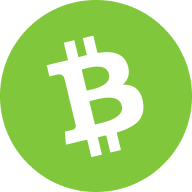How can I buy Bitcoin Cash on OKX?
Whether you're new to crypto or an experienced trader, you can buy Bitcoin Cash using the OKX Wallet or Exchange.

Step one
Get OKX
Download the app and sign up in a matter of minutes.

Step two
Fund your account
Deposit funds via bank transfer, credit card, or Apple Pay.

Step three
Choose Bitcoin Cash
Select Bitcoin Cash and buy using your chosen method.

Step four
Receive your Bitcoin Cash
Confirm your purchase and store your Bitcoin Cash in your portfolio.
What's Bitcoin Cash?
Bitcoin Cash is a type of digital money, like an online version of cash. It was created to make sending money to others faster and cheaper. Imagine you want to give a friend a dollar, but instead of handing them a paper bill, you send it through the internet. Bitcoin Cash helps people do this quickly and with low fees, solving the problem of slow and expensive transactions in the digital world.
How can I buy Bitcoin Cash?
1) Visit OKX and create an account by providing your email and setting a password. 2) Verify your identity with a government-issued ID to comply with U.S. regulations. 3) Fund your account using a bank transfer, credit card, or other local payment methods. 4) Once your account is funded, navigate to the 'Buy Crypto' section. 5) Select Bitcoin Cash, enter the amount you wish to purchase, and confirm the transaction.
Why do people buy Bitcoin Cash?
People buy Bitcoin Cash because it allows for fast and low-cost transactions, making it useful for everyday payments. It's widely accepted in various online and physical stores, enhancing its utility. Bitcoin Cash also supports peer-to-peer transactions without needing a bank, offering financial freedom. However, it's important to note that its value can fluctuate, and it's not universally accepted everywhere yet.
Things to know before buying Bitcoin Cash in the United States
In the United States, cryptocurrencies like Bitcoin Cash are legal but regulated. You must complete KYC/AML verification when buying or selling. The IRS considers cryptocurrency as property, so you may need to report gains or losses on your taxes. If you earn Bitcoin Cash through work or rewards, it might be considered income. Always consult a tax professional for detailed advice.
What are other ways to own Bitcoin Cash?
You can obtain Bitcoin Cash without buying it by participating in airdrops, where free tokens are distributed to users. Some platforms offer Learn-and-Earn programs, rewarding you with Bitcoin Cash for completing educational tasks. You might also earn it by providing liquidity in certain financial services or through referral programs. These methods require effort and understanding of potential risks.
How can I store my Bitcoin Cash?
To keep your Bitcoin Cash safe, you can use a custodial wallet, where a service holds it for you, or a non-custodial wallet, where you control it. Hot wallets are online and convenient but less secure, while cold wallets are offline and more secure. Always back up your wallet and keep recovery phrases safe. Use strong passwords and enable two-factor authentication to protect your assets.
Why should I buy Bitcoin Cash on OKX in the UAE?
Learn more about the security measures keeping your Bitcoin Cash safe and readily available.
Proof of Reserves
Our 1:1 reserve ensures your funds will always be available to you.

High liquidity
Our high trading volumes mean deeper liquidity and smoother execution for you.
Transparency
We ensure historical market data is available to you at all times.
Security
We adhere to the strictest global security and compliance standards.

Learn more about how to buy Bitcoin Cash (BCH)
NFT Marketplace Guide: Best Platforms to Buy, Sell, and Create NFTs
Did you know that NFT marketplace trading volumes for Ethereum NFTs topped $18 billion in 2023, signaling an unstoppable rise in digital art and collectibles? As more people join the NFT space, unders
How to Exchange Crypto and Swap Digital Assets
As you spend more time in the cryptocurrency market, you'll quickly want to do more than just buy and hold a single asset. You'll want to exchange your Bitcoin for a promising new altcoin, or swap you
How to Recover Crypto Password?
Every year, millions in crypto are stranded due to a lost or forgotten crypto password—but you don’t have to be one of them. Whether you’re struggling to sign in to your exchange account or can’t reme
How to Transfer, Withdraw, and Stay Secure in OKX Wallet
More users than ever are withdrawing crypto using the OKX wallet for fast, secure, and flexible self-custody. But how do you avoid mistakes and unnecessary fees? In this beginner-friendly guide, you’l
How to get Bitcoin Cash for free
Invite friends, earn rewards
See how you can get free Bitcoin Cash when you invite friends to trade with you.
Earn APY on your crypto
Earn interest down to every dollar and watch your Bitcoin Cash grow, for free. Put your crypto to work, 24/7.
Join airdrop campaigns
You can get free Bitcoin Cash airdropped to you when you join campaigns.
See what you can do with your crypto
Now that you’ve mastered the art of buying crypto, check out its potential.

Trade Bitcoin Cash
Take advantage of price fluctuations and trade your Bitcoin Cash for other cryptocurrencies.

Send Bitcoin Cash
Send your Bitcoin Cash anywhere, anytime with fast, low-cost transfers.

Spend Bitcoin Cash
Use your Bitcoin Cash to pay for goods, services, and experiences seamlessly.

Hold Bitcoin Cash
If you think your Bitcoin Cash will increase in value, you can hold onto it.

Sell Bitcoin Cash
Convert your Bitcoin Cash to cash quickly and securely.
Depending on where you’re located, you can use bank transfer, credit/debit card, or Peer-to-Peer. Read our guide on how to use these different payment methods to buy Bitcoin Cash BCH safely on a trusted exchange like OKX.
Choose the best exchange to buy Bitcoin Cash (BCH) depending on your individual needs. Factors to consider when picking the best place to buy Bitcoin Cash (BCH) include: security measures, platform transparency, fees, and efficient transaction processes. First-time beginners can consider trusted exchanges such as OKX.
Countries and regions differ on how digital assets transactions and holdings are taxed and how they view digital assets in general (money, property, commodity). In general, it is expected that you will pay capital gains tax when selling or swapping Bitcoin Cash. Refer here for a more detailed guide.
There are exchanges that offer users privacy and do not require verification to complete transactions. However, it is important to exercise caution as such exchanges might be more prone to fraud.
Use a trusted, centralized exchange such as OKX, which offers the ability to buy and sell Bitcoin Cash (BCH), as well as fiat withdrawal options.
This depends on the method you use to convert Bitcoin Cash (BCH) to cash. Withdrawals to a bank can take one to three working days to process, while withdrawals to a debit card can be almost instantaneous.
To buy Bitcoin Cash in the UAE, the first step is to create an account with a cryptocurrency exchange that supports Bitcoin Cash. After signing up, you may need to complete identity verification before you can start trading. Once you get verified, you can deposit funds using a payment method that suits you, such as bank transfer, credit card, or supported e-wallet services.
Once you’ve funded your account, you can choose to buy Bitcoin Cash at the current market price or set a limit order to specify your purchase price. Exchanges will usually show you the amount of Bitcoin Cash you’ll receive for the amount you intend to buy, so you can review it before confirming your order.
After you buy Bitcoin Cash, it’ll be credited to the exchange wallet linked to your account. While you can hold it there, many choose to transfer their Bitcoin Cash to a private or hardware wallet for additional control and security. Always review fees, available payment methods, and withdrawal options to ensure a smooth experience when buying Bitcoin Cash in the UAE.
Once you’ve funded your account, you can choose to buy Bitcoin Cash at the current market price or set a limit order to specify your purchase price. Exchanges will usually show you the amount of Bitcoin Cash you’ll receive for the amount you intend to buy, so you can review it before confirming your order.
After you buy Bitcoin Cash, it’ll be credited to the exchange wallet linked to your account. While you can hold it there, many choose to transfer their Bitcoin Cash to a private or hardware wallet for additional control and security. Always review fees, available payment methods, and withdrawal options to ensure a smooth experience when buying Bitcoin Cash in the UAE.
To cash out of Bitcoin Cash in the UAE, the first step is to transfer your tokens to a cryptocurrency exchange that supports withdrawals into fiat currency. Once your Bitcoin Cash is deposited into your exchange wallet, you can place a sell order. Depending on the exchange, you may be able to sell Bitcoin Cash directly into local currency or first convert it into a widely used cryptocurrency like Bitcoin (BTC) or Tether (USDT) before cashing out.
After completing the sale, your balance will appear in fiat currency within your exchange account. From there, you can withdraw funds through available payment channels such as bank transfers, card withdrawals, or third-party payment providers. The specific options and processing times vary across platforms, so reviewing withdrawal fees, limits, and timelines beforehand is recommended.
Finally, keep in mind that most exchanges require account verification before enabling fiat withdrawals, especially for larger amounts. By ensuring your account details are up to date, you can help avoid delays when transferring funds from your exchange wallet to your personal bank account in the UAE.
After completing the sale, your balance will appear in fiat currency within your exchange account. From there, you can withdraw funds through available payment channels such as bank transfers, card withdrawals, or third-party payment providers. The specific options and processing times vary across platforms, so reviewing withdrawal fees, limits, and timelines beforehand is recommended.
Finally, keep in mind that most exchanges require account verification before enabling fiat withdrawals, especially for larger amounts. By ensuring your account details are up to date, you can help avoid delays when transferring funds from your exchange wallet to your personal bank account in the UAE.
The price of Bitcoin Cash in the UAE is determined by supply and demand across cryptocurrency exchanges. Since digital assets are traded globally, the value of Bitcoin Cash is usually quoted in major currencies such as USD, but most exchanges also display prices in local currency. This makes it easier to see the equivalent value of Bitcoin Cash when buying or selling within the UAE.
It is important to note that cryptocurrency prices can fluctuate significantly within short periods of time. Factors such as market liquidity, trading volume, investor sentiment, and broader market conditions can all influence the value of Bitcoin Cash. As a result, the quoted price you see may change between the moment you check and the time you complete a transaction.
To stay updated, you can monitor live market data on exchanges or use crypto tracking tools that provide real-time prices, historical charts, and conversion calculators. This helps you understand the current value of Bitcoin Cash in the UAE and make more informed trading decisions.
It is important to note that cryptocurrency prices can fluctuate significantly within short periods of time. Factors such as market liquidity, trading volume, investor sentiment, and broader market conditions can all influence the value of Bitcoin Cash. As a result, the quoted price you see may change between the moment you check and the time you complete a transaction.
To stay updated, you can monitor live market data on exchanges or use crypto tracking tools that provide real-time prices, historical charts, and conversion calculators. This helps you understand the current value of Bitcoin Cash in the UAE and make more informed trading decisions.
Countries and regions vary in how they classify and tax digital asset transactions and crypto holdings. Some treat digital assets as currency or money, others as property or commodities, which directly affects tax obligations and reporting requirements. In jurisdictions like the UAE, and many others, it is generally expected that you’ll need to pay capital gains tax when selling or swapping Bitcoin Cash, but specific tax rules may vary. While buying Bitcoin Cash itself is often not taxable, profits realized from trading, selling, or exchanging Bitcoin Cash may be subject to income tax or capital gains tax under local tax frameworks.
Additionally, regulators are increasingly focusing on how to classify and regulate crypto for tax purposes, with many countries setting reporting obligations for digital asset holdings and transactions. Due to the evolving nature of crypto regulations globally, it’s crucial for traders to stay informed about local laws, reporting deadlines, and potential tax liabilities related to their crypto activity.
Additionally, regulators are increasingly focusing on how to classify and regulate crypto for tax purposes, with many countries setting reporting obligations for digital asset holdings and transactions. Due to the evolving nature of crypto regulations globally, it’s crucial for traders to stay informed about local laws, reporting deadlines, and potential tax liabilities related to their crypto activity.
You can buy Bitcoin Cash in the UAE, provided that it’s supported within the local regulatory framework. To get started, create an account on a reputable crypto exchange. Once you complete identity verification, you’ll be able to deposit funds using supported payment methods such as bank transfers, card payments, or other available options in the UAE. With your account funded, you can search for Bitcoin Cash and place an order—either buying instantly at the market price or setting a limit order if you prefer to choose your own entry price. The options available will depend on your chosen exchange.
Disclaimer
This is provided for informational purposes only. It is not intended to provide (i) investment advice or an investment recommendation, (ii) an offer, solicitation, or inducement to buy, sell or hold digital assets, or (iii) financial, accounting, legal or tax advice. Digital assets, including stablecoins and NFTs, are subject to market volatility, involve a high degree of risk, and can lose value. You should carefully consider whether trading or holding digital assets is suitable for you in light of your financial condition and risk tolerance. Please consult your legal/tax/investment professional for questions about your specific circumstances. Not all products are offered in all regions. For more details, please refer to the OKX Terms of Use and Risk Warning. OKX Web3 Wallet and its ancillary services are subject to separate Terms of Service.
You are viewing content that has been summarized by AI. Please be aware that the information provided may not be accurate, complete, or up-to-date. This information is not (i) investment advice or an investment recommendation, (ii) an offer, solicitation, or inducement to buy, sell or hold digital assets, or (iii) financial, accounting, legal or tax advice. Digital assets are subject to market volatility, involve a high degree of risk, and can lose value. You should carefully consider whether trading or holding digital assets is suitable for you in light of your financial condition and risk tolerance. Please consult your legal/tax/investment professional for questions about your specific circumstances.
You are viewing content that has been summarized by AI. Please be aware that the information provided may not be accurate, complete, or up-to-date. This information is not (i) investment advice or an investment recommendation, (ii) an offer, solicitation, or inducement to buy, sell or hold digital assets, or (iii) financial, accounting, legal or tax advice. Digital assets are subject to market volatility, involve a high degree of risk, and can lose value. You should carefully consider whether trading or holding digital assets is suitable for you in light of your financial condition and risk tolerance. Please consult your legal/tax/investment professional for questions about your specific circumstances.





















